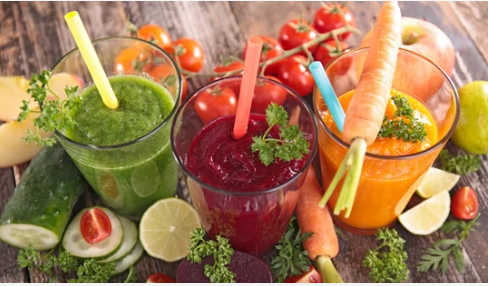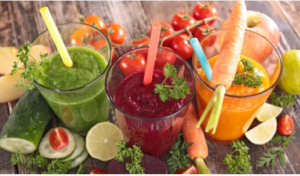
Vegetable juices: elixirs of health.

Who should use fresh vegetable juice?
Vegetable juices are interesting for a wide range of people who are devitalized, tired, with an unbalanced diet or with digestive and intestinal problems (irritable bowel syndrome, inflammatory bowel diseases, etc.). Unlike whole foods which require several hours of digestion before the nutrients they contain are assimilated at the cellular level, vegetable juices arrive directly in our digestive system ready to be assimilated, not trapped in cellulose.
Therefore, juices extracted from fresh, raw vegetables are a great way to provide our cells and tissues with a quick, extra supply of the nutrients and enzymes we need. So, it is vitally important to use “living foods” to give our cells what they need to repair themselves as they reproduce. The intake of fresh juices to our diet ensures quick and easy assimilation of nutrients.
Make your own juice at home or buy it ready-made?
No store-bought bottled juice contains all the vital elements that freshly made juice contains. It is important to note that enzymes begin to disappear from a liquid after about half an hour. In addition, bottled juices must be brought to a boil to keep them fresh, which makes them “dead” because all the enzymes are killed by the heat.
The best solution is to make your own juices, using a juicer that “chews” the vegetables, i.e. crushes the cell wall of the fiber. Cheaper centrifugal juicers “scrape” the vegetables rather than grind them, and many nutrients remain in the fiber.
Summary of the juices that are most interesting for your health.
Carrot juice
Reasonable amounts are 300 to 500ml per day. It has the effect of helping to normalize the entire system. It is the richest source of vitamin A that the human body can assimilate quickly, and provides an important supply of vitamins B, C, D, E, G, and K. It opens the appetite and facilitates digestion. It is particularly rich in vital organic alkaline elements such as potassium. It also has a good content of calcium, magnesium and iron, while phosphorus, sulfur and silicon perfectly balance the previous ones.
It is often recommended for the consolidation and maintenance of the bone structure of the teeth (calcium, vitamin K) as well as eye health (pro-vitamin A, antioxidants). Raw carrot juice is a support agent for immunity (vitamin A, C and B6) and the nervous system, stimulating vigor and vitality. Weaknesses in the liver and intestines are sometimes due to deficiencies in the elements that carrot juice is rich in. Carrot juice is also an ally in the protection of the skin, rich in antioxidants (lutein, B-carotene, zeaxanthin) and nutrients precursors of melanin, which protects the skin from solar ultraviolet rays and gives it its tan. Also, problems of dry skin, dermatitis, and other skin spots are often due to deficiencies in the nutrients contained in carrot juice. The endocrine glands, mainly gonads and adrenal glands, need the nutrients present in raw carrot juice.
Carrot juice offers a combination of nutrients for the whole body. Although less sweet than orange juice, carrot juice is still the sweetest vegetable juice, so it should be consumed with discretion in the case of a diabetic or pre-diabetic profile (the absence of fiber increases its glycemic load).
Beet juice
Beet is rich in betalains (betacyanins, betaxanthins), flavonoids, polyphenols, saponins and inorganic nitrates. It is also a rich source of various minerals such as potassium, sodium, phosphorus, calcium, magnesium, copper, iron, zinc and manganese. The nitrates in beet juice, transformed into nitrites when in contact with saliva, have an impact on the oxygen supply to the muscles, muscular efficiency, tolerance and endurance and can thus have a positive impact on sports performance.
Studies suggest that beet juice has kidney protective properties. Taken in parallel with treatments, an improvement of renal functional parameters is observed in patients suffering from renal disorders. At the glycemic level, studies show that regular consumption of beet juice effectively delays the glycemic response after meals and reduces the glycemic peak. Betalains also show promise against inflammation. A still limited number of studies show that, taken as a dietary supplement, beet extracts can be anti-inflammatory, especially in arthritis patients. Finally, a growing number of studies show the antioxidant richness of beet juice (flavonoids, triterpenes, carotenoids, betalains) as well as its anticarcinogenic and anti-mutagenic potential, but clinical studies are lacking to make clear recommendations at this stage.
The excretion of red or pink urine or the coloring of the stools just after the ingestion of red beet occurs frequently (because of non metabolized betalain) but is, unless there is a sign of another pathology, benign. On the precautionary side, taking beet juice in excess can cause stomach cramps or can be disgusting because of the hepatic detoxification process and its richness in minerals. From this point of view, people suffering from mineral accumulation pathologies (hematochromatosis, Wilson’s disease, etc.) should probably use it sparingly; symmetrically it will prove useful for people with anemia and for the production of hemoglobin. Rich in oxalic acid, it should be avoided or limited in case of kidney stones.
Cucumber juice
Cucumber is very rich in water and very low in calories. It also has a cleansing action on the body by helping to eliminate metabolic waste and chemical toxins. It is probably one of the best natural diuretics known. It promotes hair growth due to its high silicon and sulfur content, especially when combined with carrot-lettuce-spinach juice. It also allows a rehydration of the skin from the inside and to preserve a beautiful skin after an exposure to the sun.
Cucumber juice is also made up of 10% sodium, 7.5% calcium, 20% phosphorus and over 40% potassium. A composition that makes it an ally in the regulation of blood pressure. On the other hand, juice specialists frequently recommend the synergy of cucumber juice and carrot juice to people prone to rheumatism, which results from excessive retention of uric acid. Adding beet juice to this combination is said to hasten relief.
Wheatgrass juice
One of the most complete juices available in nature: wheatgrass juice. Its preparation is a little more complicated but it is, so to speak, the juice of juices, whose use was popularized by Ann Wigmore, founder of the Hippocrates Institute, in the 1940s.
Wheatgrass juice contains an exceptional concentration of nutrients: flavonoids, vitamins A, B, C and E, 92 of the 118 minerals, 17 amino acids (including the 8 essential ones), enzymes in quantity... In a few days, it is possible to prepare at home a juice capable of recovering your vital energy and improving most general health problems.
Wheatgrass juice also contains a very high concentration of chlorophyll, which will allow blood regeneration. Chlorophyll allows indeed to “make new blood” by increasing the production of hemoglobin and red blood cells in anemic people. The addition of iron increases this anti-anemic effect. A Chinese study also shows a positive impact on the production of white blood cells in leukopenic people. A review article summarizing the few clinical studies available on the health benefits of herb juice lists problems as different as rheumatoid arthritis, diabetes, obesity, ulcerative colitis or oxidative stress.
During a cure of herb juice, it is suggested to consume at least 20 to 30 ml per day, and to temporarily increase to 60 ml in case of more advanced devitalization.
This article is a translation of ”Les jus de légumes : élixirs de santé”. You will find its original version at the following link: https://arcturius.org/les-jus-de-legumes-elixirs-de-sante/
Be well



